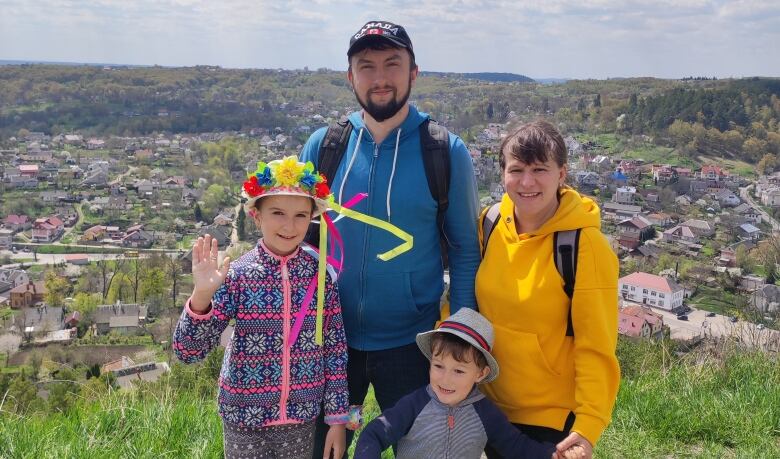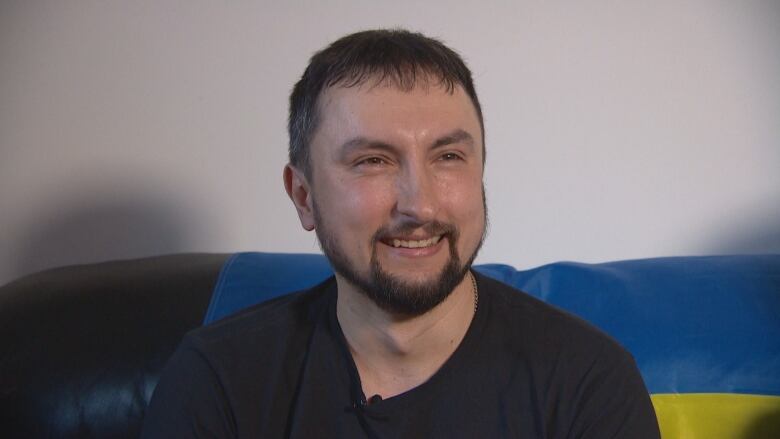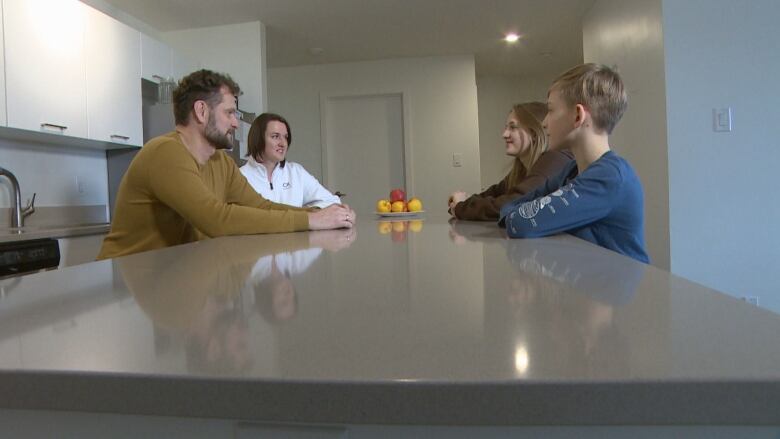Alina Kostenko awoke shortly before 5 a.m. to the sound of an explosion.
She roused her husband, Oleksandr, who tried assuring her it was just a thunderstorm — which doesn’t usually occur in Kyiv in February.
“About five minutes later, we said, ‘Let’s go,'” Alina said.
Friday marks one year since Russia invaded Ukraine.
The office of the United Nations high commissioner for human rights reports more than 21,000 civilians have so far been killed or injured during the conflict, although the actual number of casualties is believed to be much higher. War crimes have allegedly been committed.
Millions of Ukrainians have fled their homes for safety. More than 5.3 million Ukrainians were internally displaced as of Jan. 23, and there were more than eight million Ukrainian refugees across Europe as of Tuesday, according to data from the United Nations high commissioner for refugees.
In Canada, almost 167,600 Ukrainian citizens and Canadian permanent residents of Ukrainian origin had arrived by land or air as of Sunday, according to Immigration, Refugees and Citizenship Canada
Saskatchewan, meanwhile, has welcomed more than 3,200 Ukrainians throughout the province in the past year, according to a spokesperson for the provincial Ministry of Trade and Export Development.
Among them are the Kostenko and Ternovsky families. Each experienced different journeys to Saskatchewan, but there is one clear similarity — a year ago, neither imagined they’d be here.
Leaving home
Back in Kyiv, on Feb. 24, 2022, Alina and Oleksandr Kostenko leaped out of bed, packed suitcases, woke their two children, loaded their vehicle and left their apartment.
The city, split by the massive Dnipro River, has several bridges connecting one side to the other. The Kostenkos lived near one of them, Oleksandr explained, so the priority was to cross to the other side as soon as possible and stay at his parents’ house.
Getting stuck was a possibility, Alina said. If the city’s water reservoirs were destroyed, half of Kyiv would flood.
Outside, sirens rang. Driving through the streets, they saw long lines at gas stations and stores.
The family was able to cross the bridge, but the next several days were “very hard,” Alina said. Tanks arrived and weaponry was transported through the city. Occasionally there were explosions.
“It made for a very tense atmosphere,” she said.
The family learned to sleep fully clothed, in case they had to get up and run, she said.

The morning of Feb. 24, 2022, played out similarly in Odesa, a scenic port city in southwestern Ukraine, hundreds of kilometres from Kyiv.
Volodymyr Ternovsky also woke to the sound of explosions before 5 a.m. He, too, considered whether it was a thunderstorm, but quickly realized it was ammunition.
Sensing war was coming, the family had already packed luggage, he said.
“We had a plan of what to do, so we followed this plan. But still, we were scared,” said Ternovsky.

They started calling friends and family, and learned the same thing was happening elsewhere in the country.
“Everybody was [awake] already,” Ternovsky said. “They were waiting for something, but they did not know what.”
Within an hour, the family was in the car. Anastasiia Ternovska, 14, was in the backseat, her hands and legs shaking from the shock.
Once outside of the city, the reality that war had started sunk in for Anastasiia.
“I [thought] about that the whole way when I was in the car,” she said.
Coming to Saskatchewan
The Kostenkos eventually left Kyiv to live with relatives in western Ukraine. They stayed there for a couple of months, hoping the conflict would be resolved quickly, Oleksandr said.
Eventually, missile attacks started happening nearby. He and his wife began to worry as May approached.
May 9 is Victory Day in Russia, marking victory over Nazi Germany in 1945. Russian President Vladimir Putin had previously used the day to show off the strength of the Russian military by parading troops and hardware in Red Square in Moscow and other cities.
The couple was concerned the Russians may have an offensive planned that day.
“My friends on the front line said this will drag out, don’t come back, get your children out,” Alina said, through tears. “Think about the children.”

They left to stay with friends in Poland. While there, Alina found a Facebook ad about flights to Saskatchewan.
Saskatchewan, which has strong cultural ties to Ukraine, supported Ukraine before the invasion. The provincial government condemned Russia’s actions and has aided the humanitarian effort overseas and at home.
Part of that included chartering flights from Warsaw, Poland, to Saskatchewan for displaced Ukrainians. The government eventually partnered with Solidaire and Open Arms, two international humanitarian organizations, to organize up to five flights by March 31.
Oleksandr stayed up until almost midnight registering for the first flight to Regina in July, he said. He and his wife didn’t get their hopes up, but a couple of days later they learned they had seats.
“It was something like a miracle,” he said.

Four of those chartered flights have landed in Saskatchewan so far.
About one in three displaced Ukrainians who have come to Saskatchewan arrived via chartered flights, according to a spokesperson for the provincial government.
Volodymyr Ternovsky and his family, meanwhile, took a different route.
After fleeing Odesa, they stayed a few nights in a hostel in Moldova, the country that borders southwestern Ukraine, then continued westward to Munich to stay with a friend.
For two months, the family of four lived in a room that measured about 16 square metres, as Ternovsky worked on acquiring visas to Canada.

As of Feb. 16 of this year, nearly 862,400 Ukrainians had applied for a temporary resident visa to travel to and stay in Canada through the Canada-Ukraine authorization for emergency travel, according to Immigration, Refugee and Citizenship Canada data.
The program grants Ukrainians and their family members free, extended temporary status and allows them to work, study and stay in Canada until it is safe to return to Ukraine, according to the government’s website.
About two-thirds of applications have been approved so far, data shows.
Once everything was in order, the family booked a flight to Toronto, where Ternovsky has distant relatives. His family spent two weeks doing things like getting social insurance numbers and setting up bank accounts to prepare for life in Canada.

Ternovsky already had some familiarity with Canada. He worked on horticultural projects with Canadian producers through his job at Tavrija State Agrotechnical Academy, a university in Melitopol, Ukraine.
In 2006, he travelled to Saskatoon as part of a joint project.
“It was pretty familiar to me, so that is why we made the decision to come here,” Ternovsky said.
Settling in

Ten-year-old Sofiia Kostenko had always dreamed of living in a house. Now she does.
Sofiia, her parents and her younger brother Stefan moved into an empty townhouse in Regina’s Coronation Park neighbourhood in August. Thanks to many donations, the house is full of furniture, dishes and appliances — but Sofiia is still waiting on her pets.
Pets weren’t allowed in their apartment building in Ukraine, she said. But her parents assured her that, if they lived in a house, they could get a dog or cat.
“Where is my dog or cat?” Sofiaa asked her parents during an interview with CBC.
The family rents the house, Oleksandr said, so Sofiia will have to wait a while longer.
Otherwise, the family feels settled — and more importantly, safe.
“My children are safe and warm. How could I not be happy for that?” Alina said.

Sofiia and four-year-old Stefan attend St. Peter’s School, a Catholic school just down the street from their house. Sofiia has had an easy time making friends and offers to translate some subjects for new students from Ukraine.
Several of their neighbours are also displaced Ukrainians, most of whom came to Regina on the second chartered flight from Poland.
Oleksandr, who was a bank analyst in Ukraine, doesn’t have a job yet, but serves as a translator on the chartered flights. Alina is learning English at the University of Regina.
In Saskatoon, Volodymyr Ternovsky and his family are settling in well, too.
He has earned some short-term contracts working for the Saskatchewan Irrigation Projects Association, an advocacy group. His wife has found work as a seamstress, and Anastasiia and Vladyslav are enjoying school.

Anastasiia felt nervous about coming to Canada. Moving halfway across the world felt like going to another planet, she said. She worried about her schooling, where her family would live and what they would eat. But they were met with open arms and generosity.
“We were really surprised by how we were met here,” Volodymyr Ternovsky said, adding that he and his family are grateful for the help from strangers, the local Ukrainian community and government agencies.
Anastasiia attends Holy Cross High School. There are a lot of Ukrainian students, she said, and she has made friends easily.
She said she enjoys home economics class, where she has learned to cook and sew.
Both families say the flat, agricultural landscape of Saskatchewan reminds them of home.
Oleksandr Kostenko, sitting on his couch with a Ukraine flag draped over it, also said he feels the Saskatchewan flag looks similar to that of his home country.
Thinking of Ukraine
The two families are leaning into their lives in Saskatchewan, but their thoughts remain with loved ones overseas.
Every morning, the Kostenko family calls friends and family. Sofiia, who plays the flute, does virtual sessions with her instructor in Ukraine.
The Ternovsky family also keeps in touch.
Many of the people they know are displaced. Ukrainians are facing power outages, regular Russian missile attacks, and increasing prices on food and fuel, Ternovsky said.
“It is a tough life there right now,” he said.

Recently, some military officials and diplomats from countries like the United States have suggested that the conflict will be resolved at the negotiating table.
But Lee Reaney, a journalist in Lviv, a city in western Ukraine, finds that highly unlikely.
“There’s going to be a decisive victory. That’s how this ends,” said Reaney, who grew up in Saskatoon and studied international relations at the University of Saskatchewan.
“There’s not going to be a stalemated negotiating to the war. That opportunity passed in 2014 [when Russia annexed Crimea].”
Reaney expects the war to continue until at least summertime, but said it won’t end until someone backs down.

The Kostenko and Ternovsky families aren’t sure if they’ll return to Ukraine. They hope to, but recognize they don’t know when it will be safe enough to do so.
It would also mean building most of their lives from scratch — again.





More Stories
Fair share: the right office solution can take finding the right partner
Ontario faces crew shortages, aircraft issues in fight against wildfires | Globalnews.ca
Refugee attends open house at Downtown Eastside affordable housing facility – BC | Globalnews.ca